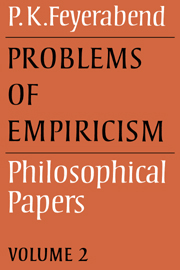Book contents
- Frontmatter
- Contents
- Introduction to volumes 1 and 2
- 1 Historical background
- 2 Classical empiricism
- 3 The structure of science
- 4 Two models of epistemic change
- 5 Philosophy of science versus scientific practice
- 6 Mach, Einstein and the Popperians
- 7 Wittgenstein's Philosophical Investigations
- 8 Consolations for the specialist
- 9 Popper's Objective Knowledge
- 10 The methodology of scientific research programmes
- 11 More clothes from the emperor's bargain basement
- Sources
- Name Index
- Subject Index
5 - Philosophy of science versus scientific practice
Observations on Mach, his followers and his opponents
Published online by Cambridge University Press: 05 June 2012
- Frontmatter
- Contents
- Introduction to volumes 1 and 2
- 1 Historical background
- 2 Classical empiricism
- 3 The structure of science
- 4 Two models of epistemic change
- 5 Philosophy of science versus scientific practice
- 6 Mach, Einstein and the Popperians
- 7 Wittgenstein's Philosophical Investigations
- 8 Consolations for the specialist
- 9 Popper's Objective Knowledge
- 10 The methodology of scientific research programmes
- 11 More clothes from the emperor's bargain basement
- Sources
- Name Index
- Subject Index
Summary
Modern philosophy of science arose from the Vienna Circle and its attempt to reconstruct the rational components of science. It is interesting to compare its approach with that of earlier philosophers, for example Ernst Mach.
Ernst Mach was a scientist. He was an expert in physics, psychology, physiology, the history of science and the general history of ideas. Ernst Mach was also an educated man. He was familiar with the arts and the literature of his time and he was interested in politics. Even when already paralysed he had himself wheeled into a session of parliament to cast his vote in connection with workers' legislation.
Ernst Mach was not satisfied with the science of his time. As he saw it science had become partially petrified. It used entities such as space and time and objective existence but without examining them. Moreover philosophers had tried to show, and scientists had started believing, that these entities could not be examined by science because they were ‘presupposed’ by it. This Mach was not prepared to accept. For him every part of science, ‘presuppositions’ included, was a possible topic of research and subject to correction.
On the other hand it was clear that the correction could not always be carried out by means of the customary procedures, which contained some ideas in a way that protected them from difficulties. It was therefore necessary to introduce a new type of research based on a new cosmology. Mach gave a rough outline of what it would assume and how it would proceed.
- Type
- Chapter
- Information
- Problems of EmpiricismPhilosophical Papers, pp. 80 - 88Publisher: Cambridge University PressPrint publication year: 1981
- 1
- Cited by

